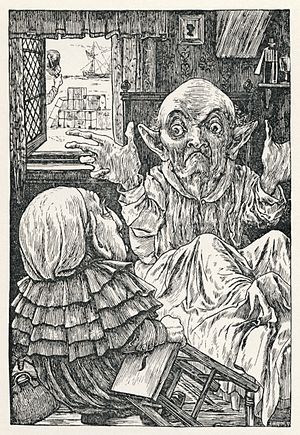Portal:Speculative fiction

Speculative fiction is an umbrella phrase encompassing the more fantastical fiction genres, specifically science fiction, fantasy, horror, supernatural fiction, superhero fiction, utopian and dystopian fiction, apocalyptic and post-apocalyptic fiction, and alternate history in literature as well as related static, motion, and virtual arts. It has been around since humans began to speak. The earliest forms of speculative fiction were likely mythological tales told around the campfire. Speculative fiction deals with the "What if?" scenarios imagined by dreamers and thinkers worldwide. Journeys to other worlds through the vast reaches of distant space; magical quests to free worlds enslaved by terrible beings; malevolent supernatural powers seeking to increase their spheres of influence across multiple dimensions and times; all of these fall into the realm of speculative fiction. Speculative fiction as a category ranges from ancient works to cutting edge, paradigm-changing, and neotraditional works of the 21st century. It can be recognized in works whose authors' intentions or the social contexts of the versions of stories they portrayed is now known. For example, Ancient Greek dramatists such as Euripides, whose play Medea (play) seemed to have offended Athenian audiences when he fictionally speculated that shamaness Medea killed her own children instead of their being killed by other Corinthians after her departure. The play Hippolytus, narratively introduced by Aphrodite, is suspected to have displeased contemporary audiences of the day because it portrayed Phaedra as too lusty. In historiography, what is now called speculative fiction has previously been termed "historical invention", "historical fiction," and other similar names. It is extensively noted in the literary criticism of the works of William Shakespeare when he co-locates Athenian Duke Theseus and Amazonian Queen Hippolyta, English fairy Puck, and Roman god Cupid all together in the fairyland of its Merovingian Germanic sovereign Oberon in A Midsummer Night's Dream. In mythography it has been termed "mythopoesis" or mythopoeia, "fictional speculation", the creative design and generation of lore, regarding such works as J. R. R. Tolkien's The Lord of the Rings. Such supernatural, alternate history, and sexuality themes continue in works produced within the modern speculative fiction genre. Jump to a specific section belowSelected profile Isaac Asimov (/ˈæzɪmɒv/ AZ-ih-mov; c. January 2, 1920 – April 6, 1992) was an American writer and professor of biochemistry at Boston University. During his lifetime, Asimov was considered one of the "Big Three" science fiction writers, along with Robert A. Heinlein and Arthur C. Clarke. A prolific writer, he wrote or edited more than 500 books. He also wrote an estimated 90,000 letters and postcards. Best known for his hard science fiction, Asimov also wrote mysteries and fantasy, as well as popular science and other non-fiction. Asimov's most famous work is the Foundation series, the first three books of which won the one-time Hugo Award for "Best All-Time Series" in 1966. His other major series are the Galactic Empire series and the Robot series. The Galactic Empire novels are set in the much earlier history of the same fictional universe as the Foundation series. Later, with Foundation and Earth (1986), he linked this distant future to the Robot series, creating a unified "future history" for his works. He also wrote more than 380 short stories, including the social science fiction novelette "Nightfall", which in 1964 was voted the best short science fiction story of all time by the Science Fiction Writers of America. Asimov wrote the Lucky Starr series of juvenile science-fiction novels using the pen name Paul French. (Full article...)Selected workThe Cat and the Canary is a 1927 American silent comedy horror film directed by the German Expressionist filmmaker Paul Leni. An adaptation of John Willard's 1922 black-comedy play of the same name, the film stars Laura La Plante as Annabelle West, Forrest Stanley as Charlie Wilder, and Creighton Hale as Paul Jones. The plot revolves around the death of Cyrus West, who is Annabelle, Charlie, and Paul's uncle, and the reading of his will twenty years later. Annabelle inherits her uncle's fortune, but when she and her family spend the night in his haunted mansion, they are stalked by a mysterious figure. Meanwhile, a lunatic mainly known as the Cat escapes from an asylum and hides in the mansion. The film is part of the genre of comedy horror films inspired by 1920s Broadway stage plays. Leni's adaptation of Willard's play blended expressionism with humor, a style for which Leni was notable and recognized by critics as unique. His directing style made The Cat and the Canary influential in the "old dark house" genre of films popular from the 1930s through the 1950s. The film was one of Universal's early horror productions and is considered "the cornerstone of Universal's school of horror". The play has been filmed five other times, most notably in 1939, starring Bob Hope and Paulette Goddard. (Full article...) Selected quote
Selected picture The fifth of Henry Holiday's original illustrations for "The Hunting of the Snark", a nonsense poem written by Lewis Carroll in 1874. (CPOTD) Did you know...
Upcoming conventionsMay:
June:
Dates can usually be found on the article page. See also these convention lists: anime, comic book, furry, gaming, multigenre, and science fiction. Selected articleFantastic Adventures was an American pulp fantasy and science fiction magazine, published from 1939 to 1953 by Ziff-Davis. It was initially edited by Raymond A. Palmer, who was also the editor of Amazing Stories, Ziff-Davis's other science fiction title. The first nine issues were in bedsheet format, but in June 1940 the magazine switched to a standard pulp size. It was almost cancelled at the end of 1940, but the October 1940 issue enjoyed unexpectedly good sales, helped by a strong cover by J. Allen St. John for Robert Moore Williams' Jongor of Lost Land. By May 1941 the magazine was on a regular monthly schedule. Historians of science fiction consider that Palmer was unable to maintain a consistently high standard of fiction, but Fantastic Adventures soon developed a reputation for light-hearted and whimsical stories. Much of the material was written by a small group of writers under both their own names and house names. The cover art, like those of many other pulps of the era, focused on beautiful women in melodramatic action scenes. One regular cover artist was H.W. McCauley, whose glamorous "MacGirl" covers were popular with the readers, though the emphasis on depictions of attractive and often partly clothed women did draw some objections. In 1949 Palmer left Ziff-Davis and was replaced by Howard Browne, who was knowledgeable and enthusiastic about fantasy fiction. Browne briefly managed to improve the quality of the fiction in Fantastic Adventures, and the period around 1951 has been described as the magazine's heyday. Browne lost interest when his plan to take Amazing Stories upmarket collapsed, and the magazine fell back into predictability. In 1952, Ziff-Davis launched another fantasy magazine, titled Fantastic, in a digest format; it was successful, and within a few months the decision was taken to end Fantastic Adventures in favor of Fantastic. The March 1953 issue of Fantastic Adventures was the last. (Full article...)On this day...Book releases Television series
Possible futuresPossible events in the future as suggested by science fiction:
Things you can do...Here are ideas for how you can help improve the coverage of speculative fiction topics on Wikipedia: Join a WikiProject or task force:
Start a requested article:
Expand a stub: Expand a new article:
Note: If no articles are shown below, please work on those found in the Archive. This list was generated from these rules. Questions and feedback are always welcome! The search is being run daily with the most recent ~14 days of results. Note: Some articles may not be relevant to this project. Rules | Match log | Results page (for watching) | Last updated: 2024-05-18 22:11 (UTC) Note: The list display can now be customized by each user. See List display personalization for details.
Recognized contentFeatured articles are considered to be the best on Wikipedia, as determined by Wikipedia's editors, and Good articles are those which are considered to be of good quality but which are not yet featured article quality. If you see one that should be listed here, please add it or post on the talk page and let us know so we can add it for you. Speculative fiction topicsCreators: Artists (list) · Authors (by nationality) · Editors Fantasy
Creators: Artists · Authors Horror
Creators: Artists · Authors SubcategoriesRelated portalsWikimediaThe following Wikimedia Foundation sister projects provide more on this subject:
Associated content
Science fiction The following Wikimedia Foundation sister projects provide more on this subject:
Fantasy The following Wikimedia Foundation sister projects provide more on this subject:
Horror The following Wikimedia Foundation sister projects provide more on this subject:
Portal directory |



























